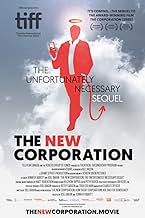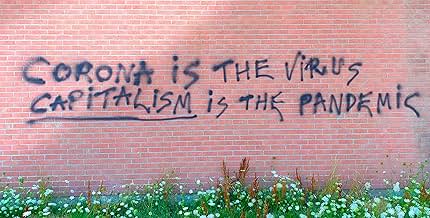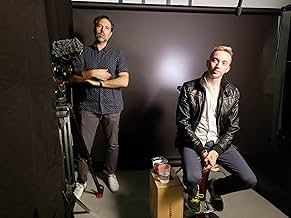The New Corporation: The Unfortunately Necessary Sequel
- 2020
- 1 Std. 45 Min.
IMDb-BEWERTUNG
7,0/10
724
IHRE BEWERTUNG
Füge eine Handlung in deiner Sprache hinzuExposes how companies are desperately rebranding as socially responsible - and how that threatens democratic freedoms.Exposes how companies are desperately rebranding as socially responsible - and how that threatens democratic freedoms.Exposes how companies are desperately rebranding as socially responsible - and how that threatens democratic freedoms.
- Regie
- Drehbuch
- Hauptbesetzung
- Auszeichnungen
- 1 Gewinn & 8 Nominierungen insgesamt
Empfohlene Bewertungen
90% of the negative reviewers either didn't watch the movie or came into it with a decidedly anti-socialism (a word that they couldn't define in real world terms) bent and pro-capitalism mindset.
For one thing, the movie is OK. Points out how big banks and corporations have taken to hiding behind the "social justice" messages they've cribbed from whatever actual movement is convenient for them at a given time. They don't pick the best interview subjects (we've all heard Bernie "Sheepdog" Sanders and AOC's (correct) spiels before). They could have sought out people like Howie Hawkins or other less-well-known advocates for *actual* socialism and for reining in the power that these organizations exercise over our government through dark money, lobbying, insider-trading and outright bribery.
Nobody including negative reviewers cares to point out how "crony capitalism" and "corporate capitalism" are any different from each other because they haven't done the homework or read authors like Michael Hudson or seen movies like "The Wobblies" about the IWW. If they had, they'd know what the "Overton Window" is and that it was in fact "radical left-wing socialists" who are responsible for the end of child labor and the 8 hour work day among many other things including the New Deal which - unlike the bailouts of too-big-to-jail banks in 2008 - bailed out the American working class and set up bulwarks against monopolistic, unethical corporate practices. The Republicans starting with Reagan and continuing through Democrats like Clinton systematically tore down as much of that as they could on behalf of their financial/corporate masters (buy bye Glass-Steagall!!! Hello NAFTA!!!) and in the same time period the Overton Window has intentionally been shifted to the right with even Starbucks baristas forming unions portrayed as "radical leftists" trying to bring down capitalism (also, why do people insist on capitalizing that word as though it's a proper noun? I'll tell you - the consistent, constant propaganda paid for by the big banks/corps and unwittingly consumed and absorbed by the would-be working class).
Take away the Overton Window and there's absolutely zero "left-wing" or "radical left" to this film. Anyone who called Obama a leftist should not be trusted to objectively review it. All in all, the Necessary Sequel is a bit of a let-down from the previous movie, but worth watching if you can do so with an open mind (something far too many of my closed-minded "conservative" friends think they have, but really don't, thanks to YouTube influencers and the like).
For one thing, the movie is OK. Points out how big banks and corporations have taken to hiding behind the "social justice" messages they've cribbed from whatever actual movement is convenient for them at a given time. They don't pick the best interview subjects (we've all heard Bernie "Sheepdog" Sanders and AOC's (correct) spiels before). They could have sought out people like Howie Hawkins or other less-well-known advocates for *actual* socialism and for reining in the power that these organizations exercise over our government through dark money, lobbying, insider-trading and outright bribery.
Nobody including negative reviewers cares to point out how "crony capitalism" and "corporate capitalism" are any different from each other because they haven't done the homework or read authors like Michael Hudson or seen movies like "The Wobblies" about the IWW. If they had, they'd know what the "Overton Window" is and that it was in fact "radical left-wing socialists" who are responsible for the end of child labor and the 8 hour work day among many other things including the New Deal which - unlike the bailouts of too-big-to-jail banks in 2008 - bailed out the American working class and set up bulwarks against monopolistic, unethical corporate practices. The Republicans starting with Reagan and continuing through Democrats like Clinton systematically tore down as much of that as they could on behalf of their financial/corporate masters (buy bye Glass-Steagall!!! Hello NAFTA!!!) and in the same time period the Overton Window has intentionally been shifted to the right with even Starbucks baristas forming unions portrayed as "radical leftists" trying to bring down capitalism (also, why do people insist on capitalizing that word as though it's a proper noun? I'll tell you - the consistent, constant propaganda paid for by the big banks/corps and unwittingly consumed and absorbed by the would-be working class).
Take away the Overton Window and there's absolutely zero "left-wing" or "radical left" to this film. Anyone who called Obama a leftist should not be trusted to objectively review it. All in all, the Necessary Sequel is a bit of a let-down from the previous movie, but worth watching if you can do so with an open mind (something far too many of my closed-minded "conservative" friends think they have, but really don't, thanks to YouTube influencers and the like).
Even though I'm totally on the capitalism-hating boundwagon, it's still hard to rate this film as a documentary regarding an unbiased, neutral look at a relative subject. Being essentially an open love letter to Bernie Sanders, Alexandria Ocasio-Cortez and all socialist activists in the west world, and likewise zealously bashing and pounding on Amazon, Facebook, Google, etc, this film shouldn't be sorted as a documentary.
How this film works, however, is regarded as an essay film which theorises certain attributes towards the "giant" corporations and their devastating and deadly effects on the present world, just "for a few dollars more". In this standpoint, the film is a wholesome and comprehensive work for it points out several pitfalls and valid issues within those corporations, builds up a hypothesis to generalize their conducts, and in the final third part arrives at a fully fleshed-out solution.
If you are looking for a documentary presenting or representing facts and realities, then this film is likely to disappoint. But if you are looking for a totally biased explanation and analysis of our modern universe, then this is definitely something to consider.
How this film works, however, is regarded as an essay film which theorises certain attributes towards the "giant" corporations and their devastating and deadly effects on the present world, just "for a few dollars more". In this standpoint, the film is a wholesome and comprehensive work for it points out several pitfalls and valid issues within those corporations, builds up a hypothesis to generalize their conducts, and in the final third part arrives at a fully fleshed-out solution.
If you are looking for a documentary presenting or representing facts and realities, then this film is likely to disappoint. But if you are looking for a totally biased explanation and analysis of our modern universe, then this is definitely something to consider.
I'm amazed by the number of reviewers who were surprised to find "socialist" or "left-leaning" commentators being interviewed for this documentary--especially those reviewers who mention the original documentary favorably. Since the thesis of the documentary is (essentially) that corporations are dangerous, I'm not sure who else they expected to be interviewed. The film features some of the same interviewees from the first film: Robert Reich, Naomi Klein, Noam Chomsky, Vandana Shiva, and so on. It does also feature a couple corporate representatives, but not the number that were featured in the longer and more in-depth first documentary.
As the film indicates with clips from Margaret Thatcher, Ronald Reagan and Milton Friedman, since the 1970's, a market-based neoliberal philosophy has come to dominate political dialogue to the point that de-regulation is a central mantra of conservatives the world over (not to mention most centrist liberals). I would challenge these reviewers who demand a more "fair and balanced" presentation to scour the internet for a mainstream right-wing politician, thinker or activist that is strongly against corporate consolidation of power. You won't find one. It would be difficult, but not impossible, do do so within the mainstream centrists (Democrats in the US, or liberal parties in other countries), as well.
On the other hand, if the demand is to present these interviews alongside those who speak on behalf of the corporation, we certainly don't need further examples of that: our lives are inundated with constant pro-corporate messages, whether explicitly in advertising, or implicitly in the various privatized systems we have to navigate on an everyday basis--you are reading this review on a website that has been owned by Amazon since 1998. The pro-corporate perspective is also represented in the first film, which is more broadly about the history of corporations and their general methods of operation; this "sequel" feels more like an addendum or appendix than something to be viewed in a vacuum. In other words, if you haven't seen the first film, you should watch that first, as it is certainly still relevant and revealing.
Chris Hedges is correct that it is hard to view the complex of issues presented currently without feeling a deep sense of despair. I think that is why the second half of the film, which I see here derided by others, is both important, and ironically the subject of such angst. We are at an impasse and many of us feel powerless to counteract global forces that seem to be spiraling toward inevitable destruction. To present this documentary without some iota of hope would not only be depressing, it would be irresponsible. In the internet age, where raising someone's ire is the surest way to generate traffic, and therefore revenue, we should take at least some time to focus on the causes that bring us together, not just the ones that piss us all off.
As the film indicates with clips from Margaret Thatcher, Ronald Reagan and Milton Friedman, since the 1970's, a market-based neoliberal philosophy has come to dominate political dialogue to the point that de-regulation is a central mantra of conservatives the world over (not to mention most centrist liberals). I would challenge these reviewers who demand a more "fair and balanced" presentation to scour the internet for a mainstream right-wing politician, thinker or activist that is strongly against corporate consolidation of power. You won't find one. It would be difficult, but not impossible, do do so within the mainstream centrists (Democrats in the US, or liberal parties in other countries), as well.
On the other hand, if the demand is to present these interviews alongside those who speak on behalf of the corporation, we certainly don't need further examples of that: our lives are inundated with constant pro-corporate messages, whether explicitly in advertising, or implicitly in the various privatized systems we have to navigate on an everyday basis--you are reading this review on a website that has been owned by Amazon since 1998. The pro-corporate perspective is also represented in the first film, which is more broadly about the history of corporations and their general methods of operation; this "sequel" feels more like an addendum or appendix than something to be viewed in a vacuum. In other words, if you haven't seen the first film, you should watch that first, as it is certainly still relevant and revealing.
Chris Hedges is correct that it is hard to view the complex of issues presented currently without feeling a deep sense of despair. I think that is why the second half of the film, which I see here derided by others, is both important, and ironically the subject of such angst. We are at an impasse and many of us feel powerless to counteract global forces that seem to be spiraling toward inevitable destruction. To present this documentary without some iota of hope would not only be depressing, it would be irresponsible. In the internet age, where raising someone's ire is the surest way to generate traffic, and therefore revenue, we should take at least some time to focus on the causes that bring us together, not just the ones that piss us all off.
I don't normally write feedback on fake reviews but these are so obvious its not funny. To name democrats and in particular to call "Kshama Sawant a socialist, but an evil one at that"...... is ridiculous. A right wing opinion that brings politics into a review of a movie/documentary is not right.
Now I will watch this and review it properly.
Now I will watch this and review it properly.
This is a well-produced documentary that starts off quite informatively by calling out how corporations use various methods to reinforce the narrative that they are socially responsible and helping the planet while simultaneously putting profits before anything. Great point made about how banks (JP Morgan is called out specifically) responsible for the 2008 crisis fancied themselves as "saviours" in the fallout by investing in a place like Detroit, where they stand to make a bundle either way. It also makes good points about corporate tax evasion and influence of their money in politics.
It really only tells one side of the story in most cases it studies however, which is a strongly socialist perspective. I'm not saying that's wrong as I myself support certain socialist ideas, but it's worth noting the politics of those being interviewed is overwhelmingly left-wing. As a result, it's more of a one-sided conversation, which is quite disappointing and a bit preachy to the viewer. As with any contemporary media these days, it also had to throw in a jab at Trump supporters because apparently they all support corporate greed and blame their struggles on minorities.
My biggest qualm is that in the last half or so it jumps from topic to topic, mostly socialist talking points, that are essentially unrelated to corporations aside from the Australian coal company. It's like I was watching a completely different documentary and it felt more like disorganized propaganda at that point.
First half, 7.5/10. Second half, 3/10. I really wish they would have gone into more depth on a couple of topics as opposed to just briefly giving left-leaning viewpoints on a cherry-picked assortment of social, economic, and political topics. It was reasonably interesting overall though, so it gets a 6.
It really only tells one side of the story in most cases it studies however, which is a strongly socialist perspective. I'm not saying that's wrong as I myself support certain socialist ideas, but it's worth noting the politics of those being interviewed is overwhelmingly left-wing. As a result, it's more of a one-sided conversation, which is quite disappointing and a bit preachy to the viewer. As with any contemporary media these days, it also had to throw in a jab at Trump supporters because apparently they all support corporate greed and blame their struggles on minorities.
My biggest qualm is that in the last half or so it jumps from topic to topic, mostly socialist talking points, that are essentially unrelated to corporations aside from the Australian coal company. It's like I was watching a completely different documentary and it felt more like disorganized propaganda at that point.
First half, 7.5/10. Second half, 3/10. I really wish they would have gone into more depth on a couple of topics as opposed to just briefly giving left-leaning viewpoints on a cherry-picked assortment of social, economic, and political topics. It was reasonably interesting overall though, so it gets a 6.
Wusstest du schon
- WissenswertesThis program documentary was funded by the biggest media corporation in Canada
- VerbindungenFollows The Corporation (2003)
Top-Auswahl
Melde dich zum Bewerten an und greife auf die Watchlist für personalisierte Empfehlungen zu.
Details
- Erscheinungsdatum
- Herkunftsland
- Offizielle Standorte
- Sprache
- Auch bekannt als
- Новая корпорация: К несчастью необходимый сиквел
- Drehorte
- Produktionsfirmen
- Weitere beteiligte Unternehmen bei IMDbPro anzeigen
- Laufzeit1 Stunde 45 Minuten
- Seitenverhältnis
- 16:9 HD
Zu dieser Seite beitragen
Bearbeitung vorschlagen oder fehlenden Inhalt hinzufügen

Oberste Lücke
By what name was The New Corporation: The Unfortunately Necessary Sequel (2020) officially released in India in English?
Antwort


















